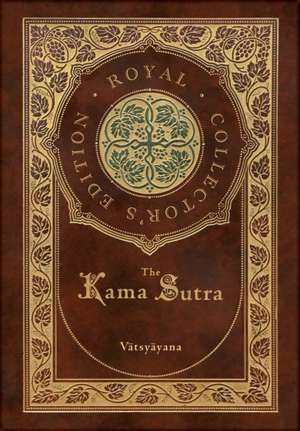The Kama Sutra (Royal Collector's Edition) (Annotated) (Case Laminate Hardcover with Jacket)
Autor V&en Limba Engleză Hardback – 30 dec 2020
Preț: 252.71 lei
Nou
Puncte Express: 379
Preț estimativ în valută:
48.36€ • 50.18$ • 40.42£
48.36€ • 50.18$ • 40.42£
Carte tipărită la comandă
Livrare economică 17-31 martie
Preluare comenzi: 021 569.72.76
Specificații
ISBN-13: 9781774760918
ISBN-10: 1774760916
Pagini: 168
Dimensiuni: 158 x 231 x 21 mm
Greutate: 0.4 kg
Editura: Engage Books
ISBN-10: 1774760916
Pagini: 168
Dimensiuni: 158 x 231 x 21 mm
Greutate: 0.4 kg
Editura: Engage Books
Notă biografică
Vātsyāyana is the name of a Hindu philosopher in the Vedic tradition who is believed to have lived around 2nd century AD in India. His name appears as the author of the Kama Sutra. Hardly anything is known about him, although it is believed that his disciples went on his instructions, on the request of the Hindu Kings in the Himalayan range to influence the hill tribals to give up the pagan cult of sacrifices. He is said to have created the legend of Tara among the hill tribes as a tantric goddess. Later as the worship spread to the east Garo hills, the goddess manifest of a 'yoni' goddess Kamakhya was created. His interest in human sexual behavior as a medium of attaining spirituality was recorded in his treatise Kama Sutra. It is impossible to fix the exact date either of the life of Vatsyayana or of his work. It is believed that he must have lived between the 1st and 6th century AD, on the following grounds: He mentions that Satakarni Satavahana, a king of Kuntal, killed Malayevati his wife with an instrument called Katamari by striking her in the passion of love. Vatsyayana quotes this case to warn people of the danger arising from some old customs of striking women when under the influence of sexual passion. This king of Kuntal is believed to have lived and reigned during the 1st century AD, and consequently Vatsyayana must have lived after him. On the other hand, another author, Varahamihira, in the eighteenth chapter of his "Brihatsanhita," discusses of the science of love, and appears to have borrowed largely from Vatsyayana on the subject. Varahamihira is believed to have lived during the 6th century, and therefore Vatsyayana must have written his works before the 6th century.
